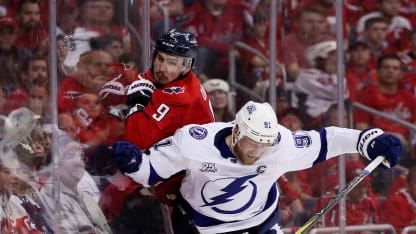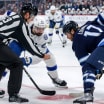Every Eastern Conference Final the Tampa Bay Lightning have played coming into this season has gone to seven games.
So it should come as no surprise the Lightning will play another Game 7 on Wednesday with a trip to the Stanley Cup Final on the line.
The Washington Capitals played like a team one loss from elimination in Game 6 Monday in front of their home crowd at Capital One Arena. And the Caps responded with arguably their best performance of the Conference Final series, shutting out the Bolts 3-0 in Game 6 and forcing a do-or-die Game 7 for both teams back in Tampa Wednesday.
Burns: 3 Things we learned from a Game 6 loss
Lightning beat writer Bryan Burns recaps the Bolts 3-0 loss in Game 6

© Patrick Smith
"They were the more desperate team tonight," Lightning captain Steven Stamkos lamented. "They played extremely hard with their back against the wall."
The Lightning had their opportunities in Game 6, mainly because Andrei Vasilevskiy was stellar once again in net and kept the Bolts close when the game was in danger of getting away from them. Unfortunately for Tampa Bay, Braden Holtby also played his best game of the series, and the Lightning were blanked on the scoreboard for the first time this postseason and the first time since Game 3 of a 2016 Eastern Conference Quarterfinal series at Detroit.
The Lightning let a chance to advance to the third Stanley Cup Final in franchise history slip away Monday night. Where did it go wrong?
In Three Things, the three biggest breakdowns for the Bolts in Game 6.
1. WASHINGTON OUTMUSCLED THE LIGHTNING
When Tampa Bay is playing at its best this postseason, it's playing with a physicality and an edge and bringing the fight to the opposition.
That fight is typically ignited by the fourth line, the trio of Chris Kunitz, Cedric Paquette and Ryan Callahan starting each of the last four games for the Lightning as a way of bringing that physical nature to the game right from the opening puck drop.
In Game 6, however, the Capitals gave the Lightning's fourth liners a taste of their own medicine. Paquette and Kunitz in particular were punished over and over after absorbing numerous tremendous hits. Dan Girardi got rocked behind his own goal, sandwiched between a pair of Caps, leaving him woozy as he slowly rose to his feet. By the end of the game, the Capitals had the Lightning so out of sorts they were running into themselves, Steven Stamkos and J.T. Miller slamming into one another as they tried to enter the offensive zone, a collision that Miller took the worst of as play had to be stopped while he laid sprawled out on the ice before slowly making his way to the bench.
"Was it a fairly even game? There's no question, but what were the hits, 39-19? Somebody was engaged and somebody wasn't," Lightning head coach Jon Cooper said. "That's a choice."
With each punishing hit the Capitals dished out, the crowd amped up even more. The Lightning wanted to take the Caps fans out of the game early with some positive plays that could get the home crowd feeling the end of their season closing in.
Instead, it was an engaged Washington team that turned the tide of the game in its favor early, fed off the energy of the crowd and kept laying the wood on the Lightning.
"They played desperate hockey, and we should have matched it and we didn't," Callahan said. "They played like their lives were on the line, and we played like we had another chance. And that's unfortunate. We've got to change the script now for Game 7."
2. SPECIAL TEAMS UNKIND TO TAMPA BAY
With the game still scoreless going into the second period, the Lightning were handed the first power play of the contest when Jay Beagle was sent to the penalty box for hooking.
After a fairly evenly-played first period, surely the Lightning would be able to execute on the power play like they'd done all series and take control of the game.
Instead, the Caps kept the Bolts from entering the zone cleanly and getting a good setup on the power play, and the resulting kill did more to swing momentum in Washington's favor than it did to get the Lightning going.
About 13 minutes later, momentum clearly on Washington's side now, the Caps were awarded their first power play of the game when Braydon Coburn was whistled for hooking. A little over a minute into the man-advantage, the Caps struck, Nicklas Backstrom finding T.J. Oshie open in the slot, and Oshie one-timing a puck past Andrei Vasilevskiy for a 1-0 lead.
With the way Game 6 was playing out, whichever team scored the first goal was likely going to win.
That goal went in favor of the Capitals, courtesy of their power play.
"We get through that first period, it was kind of a nothing period, nothing was going on," Cooper said. "There was some physical battles and stuff like that. We make a mistake on that penalty kill, it's 1-0."
Tampa Bay got another chance on the power play down 2-0 midway through the third period on a tripping call to Backstrom.
Again, the Lightning failed to generate much of anything, and the Caps even had a couple good looks at a shorthanded goal. By the time the Bolts' second power play expired, the fans in Capital One Arena could smell blood.
The Caps were close to forcing Game 7, and they knew it, special teams being a key reason why.
"We didn't get one on our chances and they did," Stamkos said. "That's why they're so important. It's another element why that they were better than us tonight, and that's why they won."
3. TURNOVERS RE-EMERGE
Over the course of their three-game win streak in the Conference Final series, the Lightning limited the number of turnovers they committed, leading to more offensive zone time, less chances given up to the Capitals and just an overall sense of crispness to the way they played the game.
The Lightning reverted back to some of their bad habits (i.e. turnovers) in Game 6, and it cost them dearly.
Particularly in the second period when Washington started to tilt the ice in its favor, the Lightning turned the puck over in the neutral zone with regularity, limiting the number of scoring chances they were able to generate and allowing the Caps to spend much of the second half of the period in the offensive zone.
"We started turning pucks over and just doing things that when you're playing the right way, you don't do, things we haven't done in the last few games and it starts to catch up," Cooper said. "So all of a sudden now, you turn the puck over, you're back in your end, they're feeling it, they're being physical, crowd's behind them and we're spending way too much time in our D zone. That's what hurt us."
After falling behind in the second period on Oshie's power-play marker, the Lightning surged to start the third and started to generate more chances offensively.
Another costly turnover, though, ended any Lightning comeback hopes. Braydon Coburn outraced Chandler Stephenson to a puck behind the Bolts' net but immediately gave the puck up to Jay Beagle along the wall.
Beagle rimmed the puck back down behind the net for Stephenson, who saw Devante Smith-Pelly streaking down the slot toward goal and fed him the puck for Smith-Pelly's fourth goal of the playoffs and second goal of the Eastern Conference Final at 10:02 of the third period.
That goal effectively sealed the win for the Caps.
"We had some chances in the third," Cooper said. "That first half of the third period, we were pushing. They were spending all the time in the D zone. They were icing the puck all the time, and we just couldn't find it. The second goal was a backbreaker. That was just a bad one to give up."


















